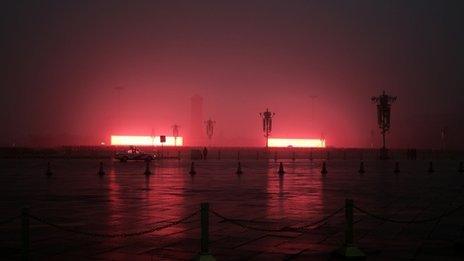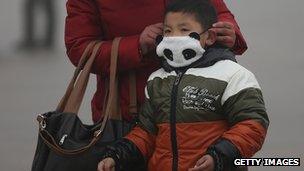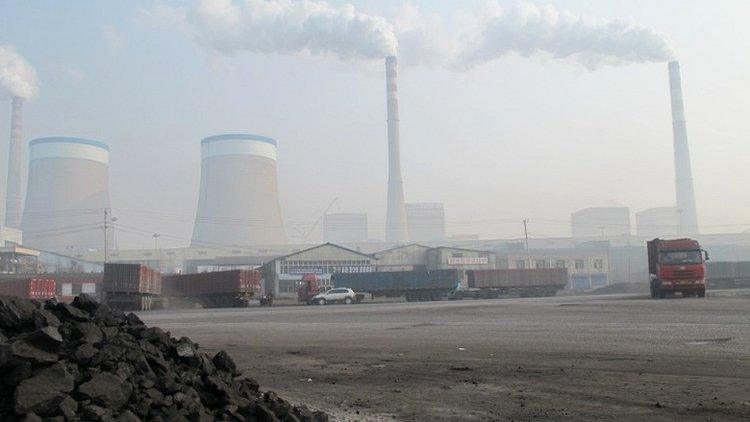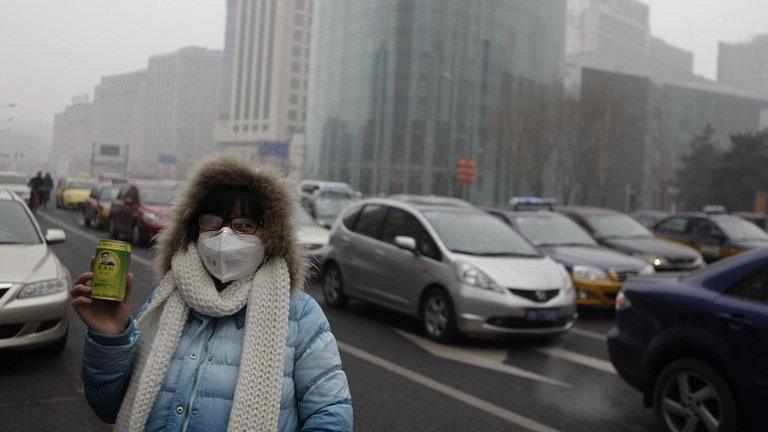'Airmageddon': China smog raises modernisation doubts
- Published
- comments

Red alert? Across Beijing, there is no escaping the blanket of pollution
All week in Beijing, in offices and homes, in lifts and shops, restaurants, taxis and buses, one topic has dominated conversation - Beijing's foul air.
The descriptions of the grey smog that's hung over the city get more and more extreme: "Airmageddon", the "Airpocalypse".
Walking out into Beijing's streets is like plunging into a swirling soup. The pollution swathes the city, wreathing everything in grey.
To get a sense of it, take a look at this slideshow, external of before and after pictures that give a sense of what China's toxic sky is really like.
A combination of coal emissions, dirty diesel and industrial gases, the smog has smothered everything for days. On Thursday, levels still hovered around the "very unhealthy" mark.
As the official Xinhua news agency reported, more flights were delayed at Tianjin close to Beijing. Visibility in Shandong province south of Beijing was just 50m (164ft).
On Thursday, too, there were reported to be more than 100 cars in crashes in Beijing, external. The roads were icy and slippery, but poor visibility cannot have helped.
What were billed as "tough" measures brought in by Beijing's government this week to try to improve things simply have not been enough.
On Tuesday, 103 factories were ordered to shut down, and a third of government cars ordered off the roads to combat what was already being described as the worst January smog since 1954, external.
But even state-controlled media now say Beijing's tough measures were ignored by city officials themselves.
Hoping for wind
More than 800 government vehicles ordered off the roads were still in use, and several construction sites ordered suspended were still active on Wednesday, Xinhua reported., external
So everyone now is looking at the weather forecast, hoping the smog will be blown away by winds forecast for Friday.
That's about the only thing that will bring some respite.
A bigger question will linger even after the smog has cleared: can China curb its polluting ways for good?
January's pollution has afflicted not just Beijing and its 20 million people, but more than 30 major cities and many tens of millions of people in addition.
As the Communist Party's English-language tabloid the Global Times put it in an editorial on Thursday, external: "China's rapid development has brought us many benefits as well as accumulated many problems. Environmental protection should take up a more prominent position in China's future strategy even if it means that China's economic development will slow down."
"Chinese people," the paper said, "should not tolerate environmental pollution for the pursuit of wealth... We cannot keep going with the situation that we have today."
The difficult bit is how to change the path China is on.
On the plus side, then, there is a growing realisation things have to change, and the media are now being allowed to debate the issue.
China's government seems to be in agreement. This week the cabinet approved , externalan energy consumption "control target" for energy use by 2015.

People are getting used to living with smog
On the minus side, that "control target" still means China's energy use will continue to expand, and, crucially, so will the burning of coal.
As Xinhua reported: "to meet the target, average annual energy consumption growth should be controlled at around 4.3% between 2011 and 2015, lower than the 6.6-percent annual increase realized between 2006 and 2010".
That means more emissions to come.
And as if to prove that changing China's habits will be hard, there is another worry on the immediate horizon.
Chinese New Year is just days away. Letting off vast quantities of fireworks is part of the Spring Festival celebrations, but the fireworks produce huge amounts of pollution.
More smog predicted
"Setting off fireworks contributed greatly to air pollution in Beijing for half a month after Spring Festival in 2011," according to Du Shaozhong, former deputy director of Beijing Municipal Environmental Protection Bureau.
Eight million people had already posted messages on China's Weibo microblogs this week debating whether the fireworks should be stopped this year.
But the office in charge of Beijing's firework industry has said that residents can set off fireworks during the Spring Festival holiday according to the regulations, but that the office hopes residents will refrain from doing so, the China Daily reported.
I predict more smog.
- Published31 January 2013

- Published31 January 2013
